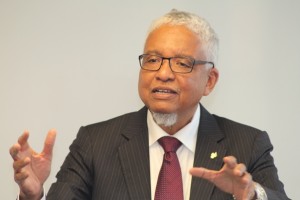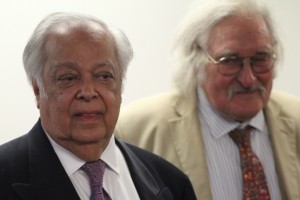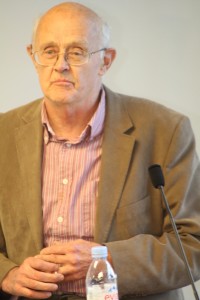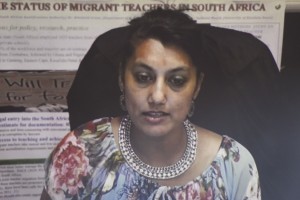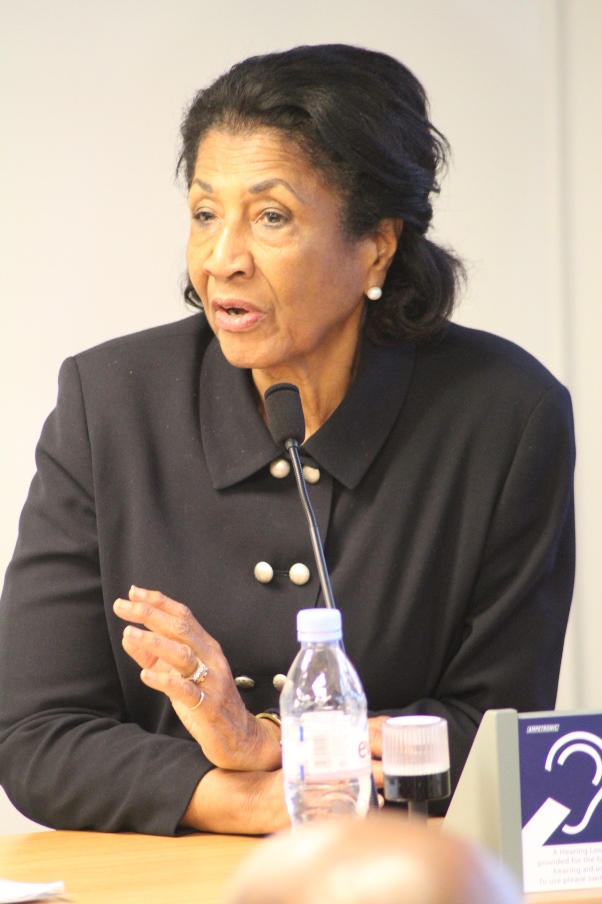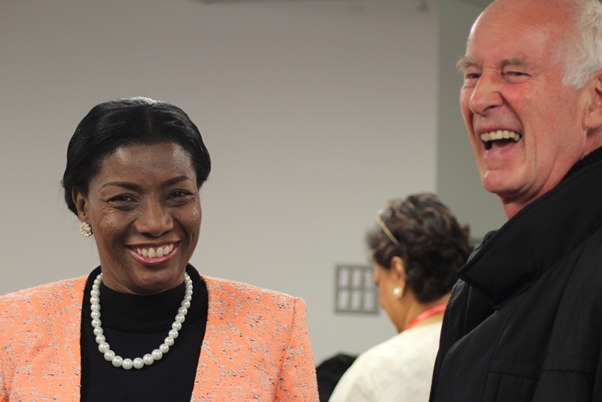On the 14th October 2015, the Ramphal Institute hosted a high-level Round table at King’s College, London on the role of tertiary education in post-colonial societies. The feature presentation was delivered by the Chancellor of the University of Guyana, Professor Nigel Eon Harris. He highlighted the integral part played by Universities in the functioning of developing countries. He then explored some of the critical challenges that they face, like funding, that can stymie their progress.
In the discussion that followed Professor Teddy Brett of the LSE addressed the crisis in tertiary education in Africa and the quality vs quantity debate. Dr Sandhana Manik of the University of KwaZulu Natal explored the low access and high dropout rates for black students in post-apartheid South Africa. Dr Casmir Chanda addressed the importance of women’s education and set out specific recommendations to tackle the problem of gender disparity prevalent in many regions.
The presentations and debate covered a wide range of issues in education across different regions of the developing world. The diverse participants at the round table included academics, diplomats and the Institute’s trustees. Also in attendance was Sir Shridath Ramphal, the former Commonwealth Secretary-General, who is a former Chancellor of the Universities of the West Indies and Warwick.
Mr. Keith Britto of King’s College welcomed the audience whilst Ramphal Institute’s Trustee, Dr Roli Degazon-Johnson introduced Professor Harris, the Institute’s Director Edwin Laurent moderated subsequent discussions and the Institute’s chairperson, Professor Patsy Robertson delivered the closing remarks.
Background to Professor Nigel Eon Harris:
Professor Eon Nigel Harris is the Chancellor of the University of Guyana prior to which he was Vice Chancellor at the University of the West Indies (UWI). Whilst Vice Chancellor he held a number of leadership positions including Chairman of the Caribbean Examination Council, Chairman of the Association of Caribbean Universities, and Chairman of the Association of Commonwealth Universities. Professor Harris is acknowledged internationally, for his contribution to the field of Rheumatology.
Summary of feature presentation by Professor Nigel Eon Harris – ‘The Evolving World of Tertiary education in Post-Colonial Societies’
Professor Harris started by making the point that post-colonial societies value ‘tertiary education’ (also referred to as third stage, third level, and post-secondary education, is the educational level following the completion of a school providing a secondary education) as much as higher education (education delivered at universities, academies, colleges, seminaries, and institutes of technology), in spite of some efforts to devalue these institutions. Local and regional higher education institutions often become the cornerstones of small and developing societies. This can be illustrated in the case of the University of the West Indies, Professor Harris stressed:
“If the graduates of the UWI were to stop working for a single day, Prime Ministerial Offices would close in at least eight or nine Caribbean island-nations, because their Prime Ministers and most of their staff are UWI graduates. Also closed in all of the sixteen or seventeen island nations would be cabinet offices, the judiciary, hospitals, educational institutions at all levels, businesses and even the churches, because many clergymen too, are graduates”.
The exponential growth in, and demand for, higher education institutions in post-colonial societies speaks to the importance of these institutions in the economic and social development of countries. Professor Harris noted that knowledge and creativity are the drivers of growth and development and as such, investing in higher education institutions is in fact investing in a country’s future. The Human Development Index (HDI) shows that those countries which show improvements in their score have indeed invested in education.
A critical consideration however is the regulation, reach and funding of such institutions. With the increasing demand and competition for limited resources post-colonial societies need to seek out novel financing solutions or risk issuing worthless degrees. In the developing world, overworked, under-qualified staff, with inadequate technological support and facilities present a significant challenge for maintaining educational quality. Whilst privatisation has in certain cases been a successful solution, without proper regulation this too can pose problems relating to the quality of degrees gained.
One solution which has garnered much media attention has been that of Massive Online Open Courses (MOOCs), which purport to provide access to world class education, free or at a low cost, to massive online audiences. Professor Harris noted however that such a platform “[ignores] the reality of a diverse multi-cultural, multi-lingual, multi-ethnic world with diverse pedagogical styles.” Smaller scale e-learning platforms are valuable and interesting ways in which to deliver higher education especially in spatially diverse populations. However such platforms could never replace the richness of learning that a campus delivers, as:
“I believe that the setting in which people are best moulded and enriched is within a classroom and in the grounds of a residential campus”.
Professor Harris concluded his presentation by reiterating the importance of higher education in the growth of countries in the developing world and leaving a memorable quote from Nelson Mandela:
“Education is the great driver of personal development. It is through education that the daughter of a peasant can become a doctor, that the son of a mine worker can become the head of the mine, that a child of farm workers can become the president of a great nation. It is what we achieve not what we are given that separates one person from another.”
Summary presentation from Professor Teddy Brett – ‘The Crisis in University Education in Africa’
Professor Teddy Brett who has had extensive experience in Africa raised the issue of quality versus quantity in the education sphere in respect of African higher education. He drew on his own experience in Uganda and noted that with the right backing and support, students, regardless of country and race can be brilliant; however growing the institutions to enable this can be complex in the context of the developing world.
He gave the example of Makerere University in Uganda, which offered at one time a highly elite and selective form of tertiary education. The university offered three thousand students from three countries free education, with the result that the tremendous cost of running the university was unsustainable. At one point in time there was a notion that, Africa needed an educated elite as a necessity for development; however the reality of limited resources and funding meant that the required education could not be sustainably achieved.
With president Idi Amin’s entrance elite education became obsolete, with the focus shifting to solely mass education. African public universities were forced to take on more students with the same number of staff. Education quality suffered as a result. Compounding factors were a vast increase in population size and the neo-liberalisation of universities which meant that many degrees attained had close to no real world value.
Professor Brett highlighted the need for state intervention, regulation and assessment in higher education institutions in the developing world. Such institutions cannot contribute to growth within a country without a clear set of accountability mechanisms in place so that students upon completion can get quality jobs.
Summary presentation of Dr Sadhana Manik – ‘Calibrating the Barometer: Student Access and Success in South African Public Higher Education Institutions’
Dr Manik, speaking from the University of KwaZulu-Natal, South Africa noted that three key trends have dominated the discourse in higher education globally, these are: elitism, ‘massification’ and access. In her presentation, Dr Manik looked at the access and dropout rates of black students in South Africa. She noted that there was need to level racial demographics in higher education institutions as the access for black students in post-apartheid South-Africa remains very low, whilst their dropout rates are high. In one qualitative study she found that many African students are still powerless to escape the poverty experienced during apartheid.
She noted that it is not a case of under-prepared students but rather one of under-prepared institutions. Marginalized students face an uphill battle in accessing education. Poverty, rural backgrounds and race are factors that all play heavily on their success. When entering higher education institutions, such students are further faced with insufficient financial support and a lack of other support structures to help them adjust to the new environment of the university.
Summary presentation of Dr Casmir Chanda – ‘Gender Equity and Access to Tertiary Education in Post-Colonial Societies’
Dr Chanda, an Education Consultant, addressed the issue of gender equality in higher education. She noted that women’s education is of utmost importance to the successful growth of any country. She summed up the role of tertiary education as follows:
“Tertiary education is a key factor in a nation‘s effort to develop a highly skilled workforce for competing in the global economy. There are important private and public benefits to participating in tertiary education, which include: higher salaries, better employment opportunities, increased savings, and upward mobility. It is also assumed that a tertiary education graduate obtains non-economic benefits including, a better quality of life, improved health, and greater opportunities for the future.”
In many regions, particularly, South Asia, and Sub-Saharan Africa, gender disparity in higher education continues to be an issue. Gender disparity holds back progress and leads to a shortfall in the ability to capture tremendous social and economic benefits. When women do have access to higher education, the additional challenge is not to limit them to ‘feminine fields’ such as the humanities, art, education, health and welfare, and the social sciences. The under-representation of women in science and engineering speaks of deeply entrenched and outdated social norms. Dr Chanda noted that whilst some universities in Africa are enacting simplistic affirmative action policies to facilitate women’s access to tertiary education, they do not necessarily enhance gender equity as they do not address the myriad challenges that women face in tertiary education. These include sexual harassment, funneling female students into subjects where they are over-represented, and not reserving sufficient places for female students.
To combat gender disparity, some of the recommendations that Dr Chanda made are: increasing financial investment in tertiary education to improve other sectors in education; investment in alternative delivery methods such as ICT and the infrastructure to support such provisions; implementing temporary affirmative action policies; combating sexual harassment in tertiary education; monitoring progress by dis-aggregating data to see whether gender parity has still to be achieved; and developing and implementing measures to reduce identified disparities (including the disadvantage of men).
In conclusion, the common themes that arose in the round table were the importance of tertiary education to development, the need for regulation, assessment, appropriate policy formulation, and novel methods to increase access, advance gender equity, improve and maintain quality and eradicate disparity. The discussions proved highly informative and engaging as the response from participants wanting answers to burning questions was overwhelming. Certainly an opportunity for a future continuation of this discussion. Article written by Edwin Laurent, director of Ramphal Institute for CaribDirect.com. Photographs by David F. Roberts / @DavidFRoberts1




